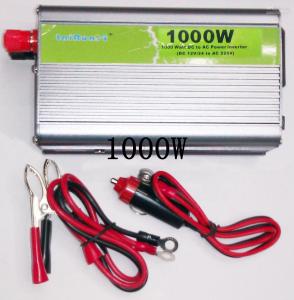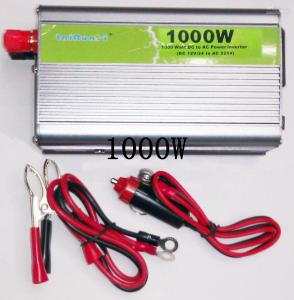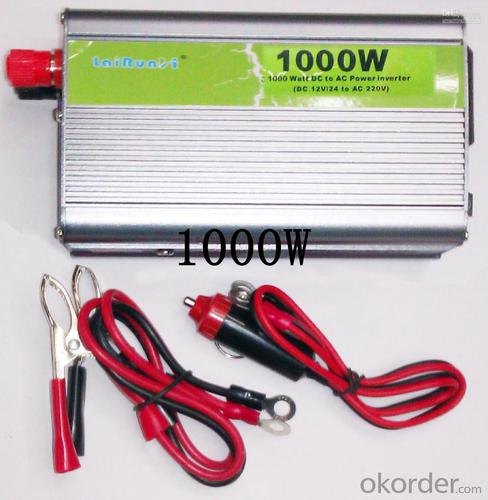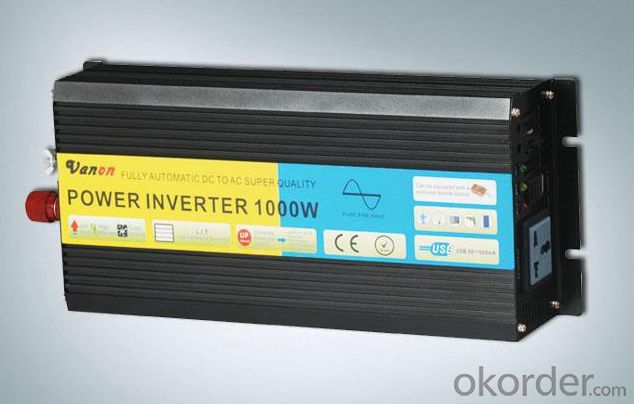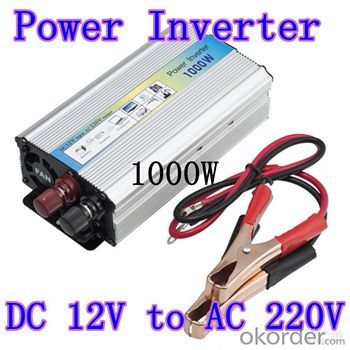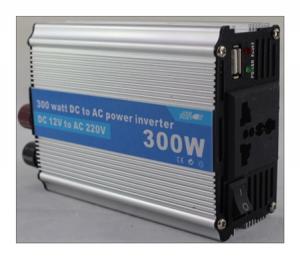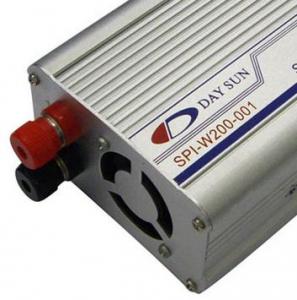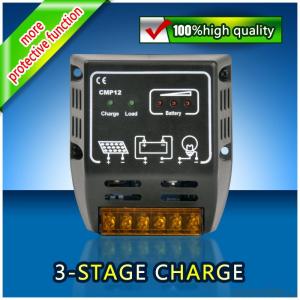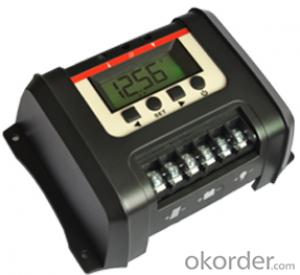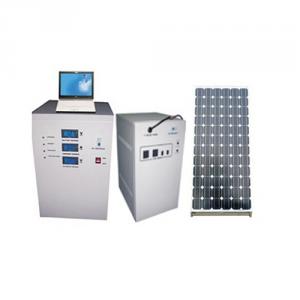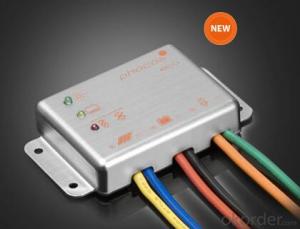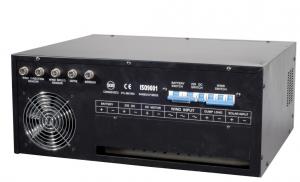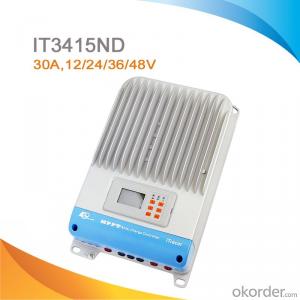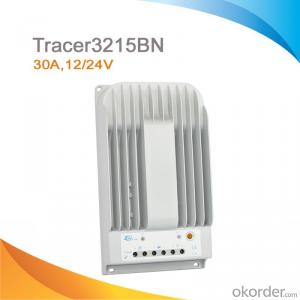Solar Controllers for High Quality 1000W Solar Charging Discharging Controller on eBay
- Loading Port:
- China main port
- Payment Terms:
- TT or LC
- Min Order Qty:
- 100 unit
- Supply Capability:
- 10000 unit/month
OKorder Service Pledge
OKorder Financial Service
You Might Also Like
1, Product desciption
Inverter circuits designed to produce a variable output voltage range are often used within motor speed controllers.
The DC power for the inverter section can be derived from a normal AC wall outlet or some other source. Control and feedback circuitry is used to adjust the final output of the inverter section which will ultimately determine the speed of the motor operating under its mechanical load.
Motor speed control needs are numerous and include things like: industrial motor driven equipment, electric vehicles, rail transport systems, and power tools. (See related: variable-frequency drive ) Switching states are developed for positive, negative and zero voltages as per the patterns given in the switching Table.
The generated gate pulses are given to each switch in accordance with the developed pattern and thus the output is obtained.
2, Features of the product
Inverters convert low frequency main AC power to higher frequency for use in induction heating.
To do this, AC power is first rectified to provide DC power. The inverter then changes the DC power to high frequency AC power. Due to the reduction in the number of DC Sources employed, the structure becomes more reliable and the output voltage has higher resolution due to an increase in the number of steps so that the reference sinusoidal voltage can be better achieved.
This configuration has recently become very popular in AC power supply and adjustable speed drive applications. This new inverter can avoid extra clamping diodes or voltage balancing capacitors. There are three kinds of level shifted modulation techniques, namely:
The first thing to figure out is the length of road in need of street lights.
This can be a small entrance road only a couple hundred of feet long to miles of streets through an area. Does the area currently have any type of lighting available.
What is the reason for needing street lights in this area
Is the electrical grid already nearby or would you need to call in the power company to bring in electrical lines.
If the electric needs to be brought to the area, how much is this going to cost? Depending on how far the grid electric is from the location of the needed lighting, this can be quite expensive.
How much lighting is needed on the street? Do the lights need to be dark sky compliant.
Do the street lights need to run from dusk to dawn or for only a specified number of hours at night.
Are the street lights able to dim in the middle of the night and still provide enough lighting.
These questions need to be answered before you can decide on how many lights you will need to complete the project.
3, Product Image
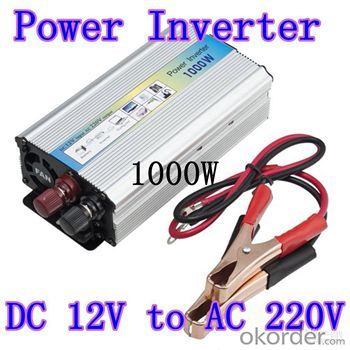
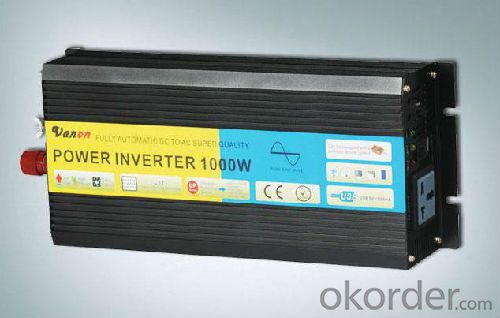
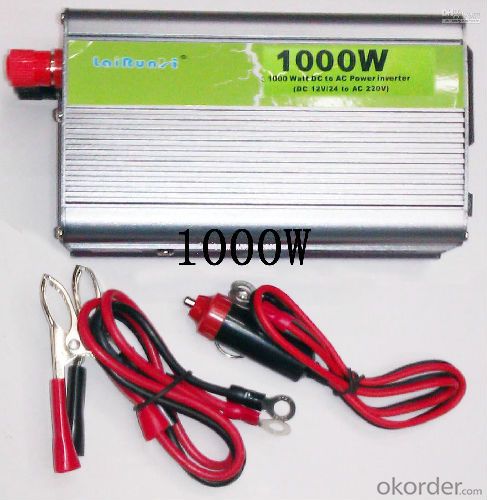
4, Detailed Specification
INPUT | |
Input voltage range | 185~265±5Vac |
OUTPUT | |
Output voltage range | 185~265±5Vac (AC mode) , 230Vac (DC mode) |
Output frequency (DC mode) | 50Hz (48~54Hz) or 60Hz(58~64Hz), same as AC(AC mode) 50Hz ±0.3Hz (DC mode) |
Wave form | Sine wave (DC Mode) |
Transfer time | 10ms. (Typical) |
BATTERY | |
Rated charging current (max.) | 45A |
Norminal DC input voltage | 12V |
Min. DC start voltage | 20V / 40V |
PHYSICAL | |
Unit dimension (mm) | 526*277*212 |
Master box dimension (mm) | 620*350*370 |
Net weight (1pc, kg) | 22.8 |
- Q: Can a solar controller be used in off-grid applications?
- Yes, a solar controller can be used in off-grid applications. In fact, it is an essential component in off-grid systems as it regulates the charging and discharging of batteries, ensuring optimal energy storage and utilization from solar panels. The solar controller helps to prevent overcharging, over-discharging, and other potential issues, making it a crucial component for off-grid power systems.
- Q: How does a solar controller protect against short circuits?
- A solar controller protects against short circuits by constantly monitoring the current flowing through the system. It is equipped with built-in circuitry that detects any sudden increase in current, which could indicate a short circuit. When a short circuit is detected, the solar controller automatically interrupts the flow of current to prevent any damage to the solar panels or connected devices.
- Q: What is the maximum input voltage for a solar controller?
- The maximum input voltage for a solar controller can vary depending on the specific model and manufacturer. However, most solar controllers typically have a maximum input voltage range of around 100-150 volts.
- Q: How do I determine the size of a solar controller for my system?
- To determine the size of a solar controller for your system, you need to consider the maximum current and voltage of your solar panels. The solar controller should be capable of handling the current and voltage outputs of your panels. Additionally, you should also consider the maximum load or power consumption of your system to ensure the controller can handle the required capacity.
- Q: The principle of solar controller
- Solar energy is a kind of radiant energy, it must be by means of energy conversion device can be transformed into electric energy.This kind of radiant energy into energy energy conversion device, is the solar cell.C solar cell is the use of photoelectric conversion principle of the sun's radiation through the semiconductor Material conversion into electrical energy devices, this photoelectric conversion process is often called "photovoltaic effect", solar cells, also known as "photovoltaic cells." When the sunlight to the P, N type two different types of conductive semiconductor Material under the PN junction, under certain conditions, the solar radiation is absorbed by the semiconductor material to form a built-in electrostatic field.If the two sides from the built-in electrostatic field leads to the electrode and connected to the appropriate load, it will form a current, which is The basic principle of solar cells. Monolithic solar cell is a thin piece of semiconductor PN junction. Under standard lighting conditions, the rated output voltage is 0.48V. In order to obtain a higher output voltage and larger capacity, often more than one solar cells connected together , At present, the solar cell photoelectric conversion rate is generally around 15%, individual developed countries, laboratory solar cell photoelectric turn The rate has been able to reach about 30%.
- Q: How does a solar controller handle different charging stages?
- A solar controller manages different charging stages by regulating the flow of electricity from the solar panels to the battery. It monitors the battery's voltage levels and adjusts the charging process accordingly. During the bulk stage, it allows maximum current to charge the battery rapidly. In the absorption stage, it reduces the charging current while maintaining a constant voltage to ensure the battery is fully charged. Finally, during the float stage, the controller maintains a lower voltage to prevent overcharging and keep the battery in a fully charged state.
- Q: What is the role of a solar controller in preventing damage to the solar panels from overvoltage conditions?
- The role of a solar controller in preventing damage to the solar panels from overvoltage conditions is to regulate and control the amount of voltage and current flowing from the solar panels to the batteries or grid. It ensures that the voltage stays within safe limits by monitoring the charging process and preventing overcharging. By effectively managing the flow of electricity, the solar controller protects the solar panels from potential damage caused by excessive voltage and helps maximize their lifespan and efficiency.
- Q: What is the maximum temperature rating for a solar controller?
- The maximum temperature rating for a solar controller can vary depending on the specific model and manufacturer. However, most high-quality solar controllers are designed to operate in a wide range of temperatures, typically between -40°C to 85°C (-40°F to 185°F). These temperature ranges ensure that the controller can withstand extreme weather conditions, such as hot summers or cold winters, without compromising its performance or durability. It is important to consult the manufacturer's specifications or user manual to determine the maximum temperature rating for a specific solar controller model.
- Q: Can a solar controller be used with solar-powered indoor retail facilities?
- Yes, a solar controller can be used with solar-powered indoor retail facilities. Solar controllers help regulate and optimize the charging process of the batteries that store the solar energy. In an indoor retail facility, solar panels can be installed on the roof or in areas with access to sunlight, and the solar controller ensures that the generated energy is efficiently stored and utilized to power the facility's lighting, equipment, and other electrical needs.
- Q: Can a solar controller handle power surges from the grid?
- No, a solar controller is not designed to handle power surges from the grid. Its primary function is to regulate and control the flow of power from the solar panels to the battery or load, and it does not have the capability to protect against or manage power surges coming from the grid. For that purpose, additional surge protection devices or equipment would be required.
Send your message to us
Solar Controllers for High Quality 1000W Solar Charging Discharging Controller on eBay
- Loading Port:
- China main port
- Payment Terms:
- TT or LC
- Min Order Qty:
- 100 unit
- Supply Capability:
- 10000 unit/month
OKorder Service Pledge
OKorder Financial Service
Similar products
Hot products
Hot Searches
Related keywords
